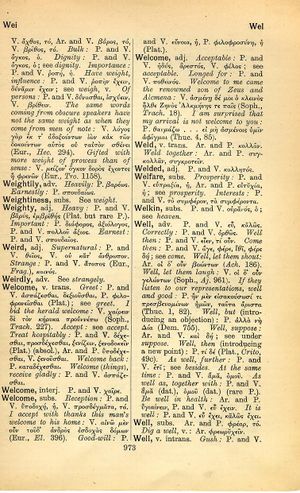well: Difference between revisions
ἔστι γὰρ τὸ ἔλαττον κακὸν μᾶλλον αἱρετὸν τοῦ μείζονος → the lesser of two evils is more desirable than the greater
(Woodhouse 5) |
(CSV5) |
||
| Line 1: | Line 1: | ||
{{ | {{Woodhouse1 | ||
| | |Text=[[File:woodhouse_973.jpg|thumb|link={{filepath:woodhouse_973.jpg}}]]'''adv.''' | ||
P. and V. [[εὖ]], [[καλῶς]]. | |||
<b class="b2">Correctly</b>: P. and V. ὀρθῶς. | |||
<b class="b2">Well then</b>: P. and V. εἶεν, τί οὖν. | |||
<b class="b2">Come then</b>: P. and V. ἄγε, φέρε, ἴθι, φέρε δή; see [[come]]. | |||
<b class="b2">Well, let them shout</b>: Ar. οἱ δʼ οὖν βοώντων (<b class="b2">Ach.</b> 186). | |||
<b class="b2">Well, let them laugh</b>: V. οἱ δʼ οὖν γελώντων (Soph., ''Aj.'' 961). | |||
<b class="b2">If they listen to our representations, well and good</b>: P. ἢν μὲν εἰσακούσωσί τι πρεσβευομένων ἡμῶν, [[ταῦτα]] ἄριστα (Thuc. 1, 82). | |||
<b class="b2">Well, but</b> (<b class="b2">introducing an objection</b>): P. ἀλλὰ νὴ Δία (Dem. 755). | |||
<b class="b2">Well, suppose</b>: Ar. and V. καὶ δή; see under [[suppose]]. | |||
<b class="b2">Well, then</b> (<b class="b2">introducing a new point</b>): P. τί δέ (Plat., <b class="b2">Crito, 4</b>9C). | |||
<b class="b2">As well, further</b>: P. and V. [[ἔτι]]; see [[besides]]. | |||
<b class="b2">At the same time</b>: P. and V. ἅμα, [[ὁμοῦ]]. | |||
<b class="b2">As well as, together with</b>: P. and V. ἅμα (dat.), [[ὁμοῦ]] (dat.) (rare P.). | |||
<b class="b2">Be well in health</b>: Ar. and P. ὑγιαίνειν, P. and V. [[εὖ]] ἔχειν. | |||
<b class="b2">It is well</b>: P. and V. [[εὖ]] ἔχει, [[καλῶς]] ἔχει. | |||
'''subs.''' | |||
Ar. and P. [[φρέαρ]], τό. | |||
<b class="b2">Dig a well</b>, v.: Ar. φρεωρυχεῖν. | |||
'''v. intrans.''' | |||
<b class="b2">Gush</b>: P. and V. ῥεῖν, ἀπορρεῖν, στάζειν (Plat. but rare P.), V. κηκίειν, ἐκπηδᾶν. | |||
<b class="b2">Of tears</b>: P. and V. λείβεσθαι (Plat.). | |||
<b class="b2">Tears well from my eyes</b>: V. ἐκ δʼ ὀμμάτων πηγαὶ κατερρώγασι (Eur., ''Alc.'' 1067). | |||
<b class="b2">Welling tears</b>: V. χλωρὰ δάκρυα (Eur., ''Med.'' 922). | |||
<b class="b2">A welling spring of water</b>: V. [[δροσώδης]] ὕδατος νοτίς (Eur., <b class="b2">Bacch.</b> 705). | |||
}} | }} | ||
Revision as of 10:09, 21 July 2017
English > Greek (Woodhouse)
adv.
Correctly: P. and V. ὀρθῶς.
Well then: P. and V. εἶεν, τί οὖν.
Come then: P. and V. ἄγε, φέρε, ἴθι, φέρε δή; see come.
Well, let them shout: Ar. οἱ δʼ οὖν βοώντων (Ach. 186).
Well, let them laugh: V. οἱ δʼ οὖν γελώντων (Soph., Aj. 961).
If they listen to our representations, well and good: P. ἢν μὲν εἰσακούσωσί τι πρεσβευομένων ἡμῶν, ταῦτα ἄριστα (Thuc. 1, 82).
Well, but (introducing an objection): P. ἀλλὰ νὴ Δία (Dem. 755).
Well, suppose: Ar. and V. καὶ δή; see under suppose.
Well, then (introducing a new point): P. τί δέ (Plat., Crito, 49C).
As well, further: P. and V. ἔτι; see besides.
At the same time: P. and V. ἅμα, ὁμοῦ.
As well as, together with: P. and V. ἅμα (dat.), ὁμοῦ (dat.) (rare P.).
Be well in health: Ar. and P. ὑγιαίνειν, P. and V. εὖ ἔχειν.
It is well: P. and V. εὖ ἔχει, καλῶς ἔχει.
subs.
Ar. and P. φρέαρ, τό.
Dig a well, v.: Ar. φρεωρυχεῖν.
v. intrans.
Gush: P. and V. ῥεῖν, ἀπορρεῖν, στάζειν (Plat. but rare P.), V. κηκίειν, ἐκπηδᾶν.
Of tears: P. and V. λείβεσθαι (Plat.).
Tears well from my eyes: V. ἐκ δʼ ὀμμάτων πηγαὶ κατερρώγασι (Eur., Alc. 1067).
Welling tears: V. χλωρὰ δάκρυα (Eur., Med. 922).
A welling spring of water: V. δροσώδης ὕδατος νοτίς (Eur., Bacch. 705).

